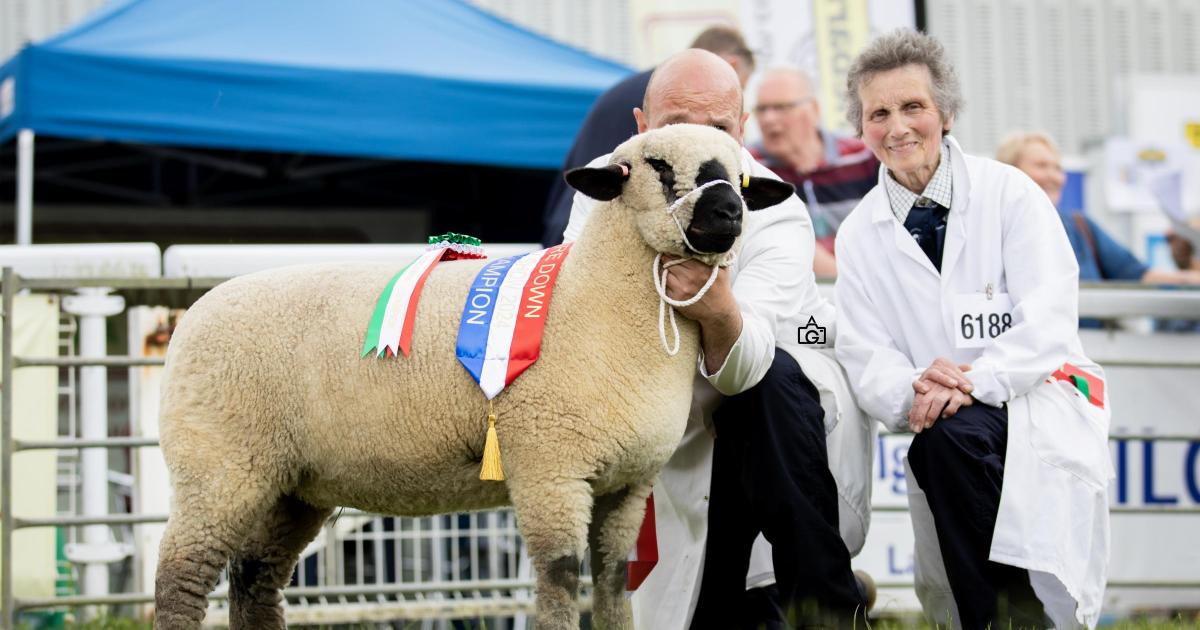Mother and son, Eirlys and Stuart Jones, run the Maes-Glas flock of Hampshire Downs.
From a flock with modest beginnings in 1995, 2024 cemented its status as one of the country’s top Hampshire Down flocks when a shearling ram sired by a Maes-Glas ram won a supreme championship in Argentina and the Jones’ captured the breed championship at the Royal Welsh Show with a ewe lamb, part of a group of three that also made the final shortlist in interbreed championship.
Eirlys and her husband, Barry, who passed away in 2017, had bought seven ewes and a ram from another Pembrokeshire breeder after they bought their 70-acre grassland farm at Wolfscastle in 1993.
Until then they were rearing bucket calves to sell as stores, predominately Hereford and Aberdeen Angus cattle, on a rented farm at nearby Croesgoch.
There were no suitable buildings on the new farm for cattle and Eirlys also experienced ill health involving major surgery at that time so the decision was made to exit beef production and to generate an alternative income from sheep.
Why Hampshire Downs? It was a breed that appealed for numerous reasons, says Eirlys, but principally because of their ability to thrive on poor pasture.
“They are pretty and docile too,’’ she adds.
After making inquiries with the Hampshire Down Sheep Breeders Association, the Joneses contacted Alan Davies who was selling his Solva flock to diversify into alpacas.
The ram in the group of eight they bought from Alan was 10 years old but he did not disappoint.
His name was Concorde which was appropriate as he had spent time in England, France and Holland before making his way to Wales.
By retaining ewe lamb replacements, numbers grew and peaked at 180 ewes but after Barry died the flock was scaled back to around 100 plus followers.
To maintain the bloodlines, seven different rams are used at tupping and that requires seven separate fields.
Male and female progeny that don’t make the grade as breeding stock are sold fat direct to slaughter and those that do are marketed through the breed association sale in Shrewsbury in May and the National Sheep Association ram sale in the autumn.
It was 2002 when the Joneses first started to show their flock and they have since won multiple awards.
“We still hold the record at the Royal Welsh Show for the best pair in the show with lambs owned and lambed by the same person, and that person also having the lambs’ mothers and grandmothers,’’ Eirlys explains.
Before the UK exited the European Union, sheep from the Maes-Glas flock were exported to France, Spain, Ireland and other countries.
Brexit put an end to that market, says Eirlys, citing the sheer volume of paperwork and blood testing that this process now entails.
“We had three or four quite significant orders from Spain just before Brexit, we had taken the deposit and everything, but had to send it back. That was heartbreaking.’’
Their export market for embryos and ram semen has however grown, also an arduous process but nevertheless financially rewarding.
It involves a TB test, in the same way that cattle are tested, because the health requirements in some countries are even higher than in the UK, and export is preceded by three blood tests of the animals providing the genetics, to screen for other diseases.
Whether for export or not, it is a requirement of the breeders association that all registered rams must be DNA tested.
This costs £27 a time but Eirlys is in favour of it. “Some breeders are against it because of the cost but there are benefits.
“It is seldom that we buy a ram but when we do we at least can be sure of the genetics. Every flock can have an accident, a sheep jumping a hedge or sheep getting mixed up. With DNA testing you can be absolutely certain that what you think you are getting you actually are.’’
UK farmers are increasingly recognising the value of using Hampshire Down genetics.
The breed is a good feed converter which means they need less feed.
“Years ago, farmers might have been put off them because they were seen as fat and dumpy but that has been bred out of them,’’ says Eirlys.
